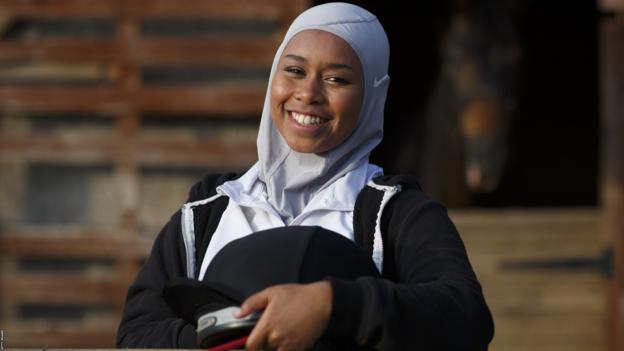Muslim women in sport: 'Slow progress' on removing barriers
Last updated on .From the section Sport

There has been "slow progress" in breaking down the "barriers and challenges" for Muslim women taking part in sport, says a new report.
The report published by England's largest Muslim women's sports charity, Muslimah Sports Association (MSA), found 97% of British Muslim women surveyed wanted to increase their current participation in sports - yet 37% are not involved in any sports or activities.
The research was carried out to identify the demand across the country for Muslim female participation in sport, and to explore the under-representation of Muslim women in sports and to what barriers they are facing.
The report says sport participation can help to break down stereotypes and misconceptions about Muslim women.
Yashmin Harun, chair and founder of MSA, said: "The impact of the pandemic and successive lockdowns was clear. It was evident physical activity levels and the general wellbeing of women from diverse backgrounds had suffered.
"The research demonstrates that progress has been slow. The barriers and challenges Muslim females face are still very much the same from reports conducted 15 years ago.
"Quite often Muslim women are left on the fringes of conversations when we talk about sports for all. The research identifies there is a huge demand for Muslim women wanting to be more active but accessibility and opportunities are rare and safe spaces are not provided."
The Muslim Women in Sport report found:
- While 80% participate in sports activities 'casually', that falls to 9% at a 'competitive' level.
- 43% of Muslim women do not think current sports facilities are appropriate to them.
- 33% say previous experiences have negatively impacted their participation in sport.
The report says areas which prevent participation include: religious/cultural barriers, the lack of women-only spaces or facilities, the lack of modest sports attire and the potential of encountering any discrimination, which could explain why there are high levels of interest but low levels of activity in taking part in sports.
The research also found that the lack of women-only spaces was a predominant barrier that was preventing women - 65% surveyed said "no" when asked if they were aware of any women's-only events, while 80% said they would be likely to attend women's only sports sessions if they were available.
One woman who took part in the report said: "Coming to a women's-only swimming session and being told there were male lifeguards - that defeats the whole purpose."
The report said: "It is important to recognise that Muslim women are not a homogeneous group and come from diverse ethnic and cultural backgrounds. They have different interpretations of their religious beliefs, and it is up to each individual to determine how they balance their religious and cultural values with their desire to participate in sport."
Under 'next steps', the report suggests: "Women only sessions is a predominant and recurring theme in our findings but is not a solution in of itself; as highlighted by some of the quotes around male lifeguards at women-only swimming sessions.
"There is much nuance to unpicking what a 'comfortable environment' means to Muslim women and scope to create some principles around this to develop a greater understanding of this for the sector as a whole."
The report found British Muslim women are also most interested to learn or participate in swimming, which was also the sport that brought the most challenges with women not being able to find "comfortable environments" to participate in.
"For Muslim women to be able to fully participate in sport we need to create environments in which their ambitions for physical and sporting activities are not in conflict with their religious commitment to modest dress and behaviour," says Ibtisam Belola, a Trustee of MSA.
MSA hopes the report will help the sector to engage more Muslim females to get active. It also hopes it will prompt open discussions on how to address unconscious bias and misconceptions against Muslim women.














